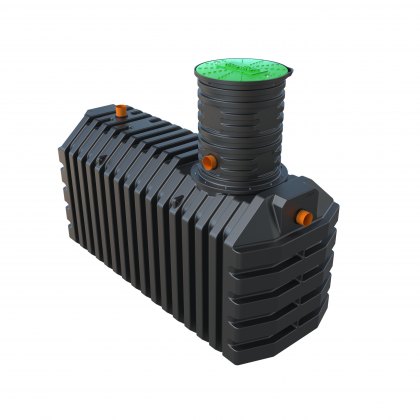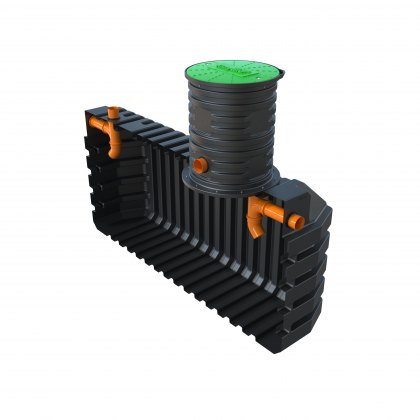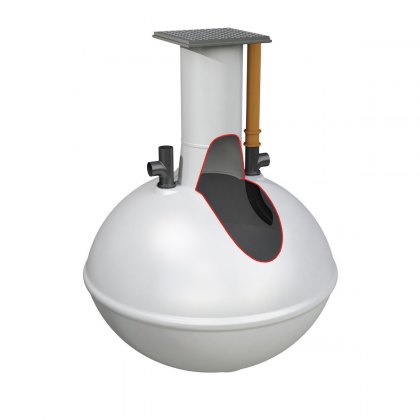Septic Tank Emptying: Everything You Need to Know

Septic tanks are used for the collection and settlement of domestic sewage for domestic dwellings without access to mains drainage.
In a septic tank, sewage enters the septic tank into a settlement chamber, allowing solid waste (sludge) to sink and liquid to rise to the surface. This surface liquid makes contact with oxygen and the organic matter starts to breakdown biologically. This liquid still contains sewage but in small enough particles to be carried through the discharge outlet and into the ground (soakaway).
Basic septic tanks only partially treat sewage and discharge effluent of low quality. Septic tanks may be installed, subject to consent, in applications where:
- Soil is of suitable porosity.
- Installation complies with Building Regulations (Approved Document H).
- The installation will not contaminate any ditch, stream or other watercourse.
To view our full range of septic tanks click Septic Tanks
If you would like more information on Septic Tank Regulations in Ireland, please click the following link - Septic Tank Regulations
Domestic waste water treatment systems (DWWTS) are used by householders to treat sewage. There are nearly half a million systems in Ireland, mostly septic tanks.
Septic Tanks
How Often Should I Empty My Septic Tank?
To keep your sewage system running correctly, your septic tank needs to be pumped out or desludged every 1 -2 years. It is extremely important to keep your septic tank maintained. If you allow your septic tank to back up it reduces the septic tanks efficiency, more repairs are needed and it can be costly to repair or replace the septic tank.
A homeowner can be fined up to €5000 for not emptying their septic tank and causing it overflowing into a water course or contaminating the land around it or a well where people get their drinking water from.
How Do I Maintain My Septic Tank?
One of the main ways to help keep your septic tank working smoothly is to avoid putting chemicals, oils, grease and other fluids or materials that are not easily broken down.
Another way to maintain your setic tank is to inspect your pump regularly to make sure it is working correctly.
Use water efficiently by using low water consumption toilets, high efficiency showerheads and using proper load sizes for your washing machines.
Maintain your drain field by not parking on it, planting trees away from the drainfield and keeping other drainage systems away from your drian field.
Do not flush items such as down your sinks or toilets:
- Cooking grease or oil
- Non-flushable wipes, such as baby wipes or other wet wipes
- Feminine hygiene products
- Condoms
- Dental floss
- Diapers
- Cigarette butts
- Coffee grounds
- Cat litter
- Paper towels
- Pharmaceuticals
- Household chemicals like gasoline, oil, pesticides, antifreeze, and paint or paint thinners

Septic Tank Range
How do you know when septic tank needs emptying?
- One sign that your septic tank needs emptying us when it overflows and the ground around the septic tank becomes wet and smells. This means your septic tank needs to be emptied urgently as the damage raw sewage run off causes could be costly to remedy.
- The grass around your septic tank could become greener.
- Another sign that your septic tank needs emptying is when your drains start acting like they are clogging up. This will also mean that your toilet flushing is slow and the washing machine is sluggish.
- Your drains could start backing up too.
How do I get my septic tank emptied?
Your septic tank needs to be emptied by a licensed company that is registered to dispose of the waste from your tank. There are many companies from your local area that you can contact to empty the septic tank.
How much does it cost to empty a septic tank?
The average price for emptying a septic tank is between €200 and €250 but this may vary depending on the size and location of the septic tank.
Septic Tank Emptying

Is it normal for a septic tank to be full of water?
Your tank should be “filled” 8 to 12 inches from the lid of the septic tank. The precise measurement can vary depending on the size and type of septic tank. Your septic tank is at the standard operating level if the water stops just below the outlet pipe. When your water level surpasses the pipe, your tank is overfilled. The high water level may come as a result of a failing system. You should have your septic system inspected and restrict water use until a professional diagnoses the issue.
Who is responsible for emptying septic tank?
If you are a homeowner, you are reponsible for emptying the septic tank. However, if you live in a rental property, this should be agreed between you and the landowner as to who is responsible for emptying the septic tank.
If you have any issues or queries regarding your septic tank, then get in touch with us today here.

Septic Tank Regulations: Everything You Need to Know

Navigating Septic Tank Grants in Ireland

 Login
Login


